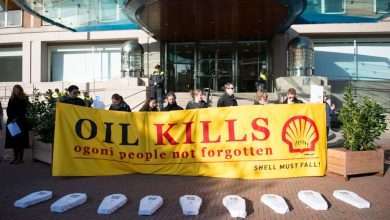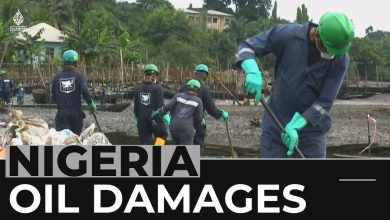Nigeria must own up to the blood shed for oil
The Nigerian government is struggling to confront its past abuses, and nowhere is this clearer than in the case of the Ogoni nine, the environmental activists from the Niger Delta hanged in 1995 by the Sani Abacha regime on trumped-up charges.
I was five years old when playwright Ken Saro-Wiwa, a leading figure in the Ogoni people’s movement, was executed alongside eight others, and I lived through the legacy of his fight to protect the oil-rich land by Shell and other corporations.
As a young boy growing up in the Niger Delta, there was no escape from oil. Spillages, the vandalisation of oil pipes, the deaths from polluted water – headlines reported these horrors weekly. We were always aware of the price indigenous communities were being forced to pay, losing their land and all beneath it to the state and its foreign partners. Saro-Wiwa died fighting to change that.
Today is the 20th anniversary of their “judicial killing”, but attempts to draw attention to the cause they fought for has been shut down by state authorities – not for the first time.
A memorial in the form of a large steel bus was impounded by customs in Lagos for six weeks because it is considered “politically inflammatory”. A quote from Saro-Wiwa written on the side of the sculpture accuses the oil companies of “practising genocide against the Ogoni”.
Hameed Ali, current controller-general of the Nigeria’s customs authority – responsible for detaining the sculpture – was a member of the tribunal that ordered the execution in 1995, a fact seized upon by commentators who suggest that the culture of silence and denial around the deaths remains strong today.
There has been no official government apology to the families of the Ogoni nine. “They’re passing a message that they do not regret their actions,” says Saatah Nubari, a Port Harcourt-based activist.
Hell on Earth
For tresidents who continue to live in the Niger Delta, recognition of past abuses is about righting the wrongs perpetrated by the government and multinational corporations and giving voice to local people who have for decades seen their land devastated by oil spills.
In 2011, a report by the United Nations environment programme confirmed what Saro-Wiwa had been saying two decades ago – that his homeland had become hell on Earth.
The report stressed the severity of the environmental impact of oil exploration, pointing to the alarming presence of benzene in wells in the Nisisioken Ogale area at a level more than 900% higher than World Health Organisation guidelines.
But the report was never acted upon, despite then-president Goodluck Jonathan hailing from the Delta region. In July this year, his successor Muhammadu Buhari finally ordered the implementation of the recommendations, including a thorough cleanup of the area. But despite these positive overtures, respite from pollution remains a long way off. The UN study predicts it will take 30 years to clean up the spills.
Nwilo Bura-Bari, a writer and volunteer at the Centre for Ogoni Studies in Port Harcourt, says the report must be implemented urgently. “The amount of environmental degradation in our homeland has piled up from decades of pollution,” he says. “Ogoni people need to smile again.”
For its role in the region’s devastation, Shell parted with $15.5m as settlement in 2009 to the families of the slain nine, but insisted the money was not an admission of guilt.
In January this year, the company agreed to pay a further $83.3m in compensation to residents of the Bodo community in Ogoniland for two oil spills in 2008. Activists and civil societies regard the payout as pittance, blaming the government and state regulators for its leniency.
“I personally feel the compensation was an insult to the Ogoni people,” Nubari says. “But you wouldn’t even blame Shell, they are been propped up by a state that sees foreign corporations as saviours. The weakness of the Nigerian state is the main reason why Shell can even be nonchalant in the first place.”
Simon Nwakandu, a spokesman for the Rivers state government, which recently renamed the state polytechnic after Saro-Wiwa, says it holds the Ogoni people in high esteem. “The administration will continue to work with all stakeholders to address the environmental challenges facing Ogoniland.” It remains to be seen how that will be achieved without the cooperation of a federal government that seems to have moved on.
For the people of Ogoni and the rest of the Niger Delta, their gift remains a curse and the fight for justice that Saro-Wiwa and others were fighting for, continues.
(Source: THE GUARDIAN)




